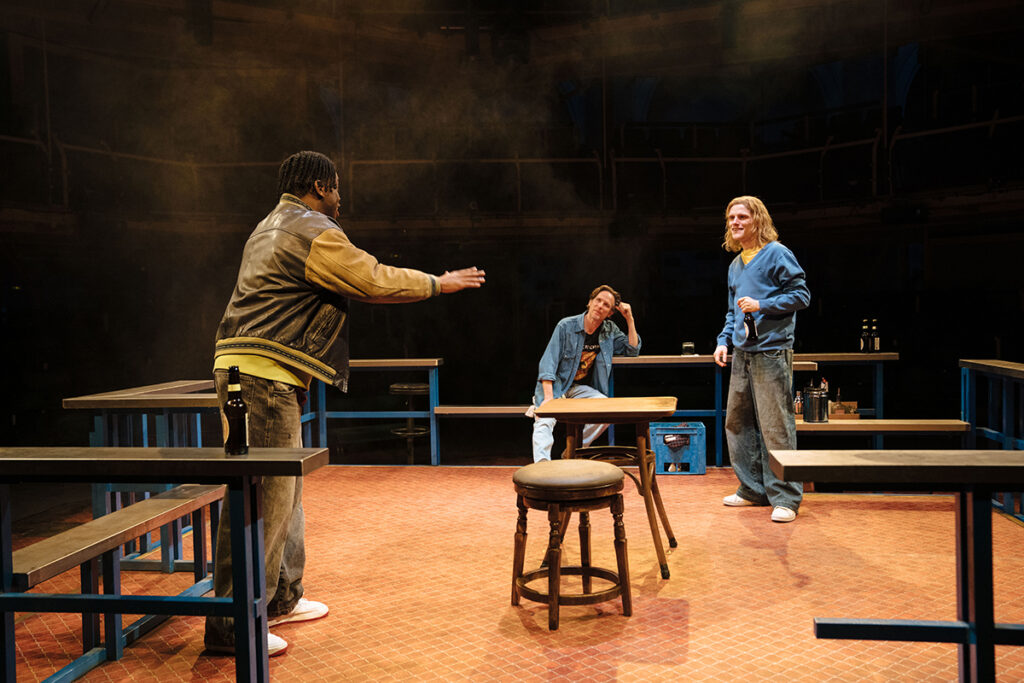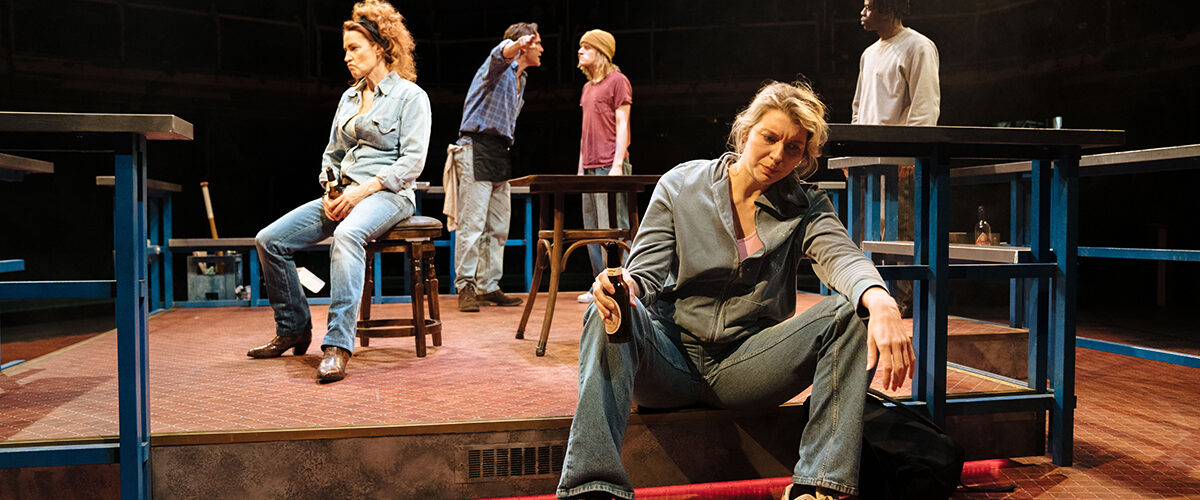It has been a particular gripe of mine that middle class writers often present the poor as a subhuman genus, pouring neat vodka on their morning cornflakes.
Determinedly bucking this trend, we now have ‘Sweat’, an American import by writer, Lynn Nottage, who researched diligently and came to understand that the characters who would people her script – blue collar workers from the Pennsylvania rust belt – were not monsters, but decent, flawed humans having their lives smashed to pulp by forces way beyond their control: viz the North American Free Trade Agreement and the financial crash of 2007-8.
Evan, a parole officer (an assured and authoritative performance by Aaron Cobham) conducts a couple of no-holds-barred interviews with deeply troubled clients. One, Jason (Lewis Gibben, all edge and anger) has had his face tattooed while inside and seems to carry the stain of half-absorbed white supremacism. The other, Chris (Abdul Sessay, grimly contrite yet far from humbled) has been touched by faith. Though they were incarcerated separately, whatever crime they committed they shared: “What we did was unforgivable,” laments Chris to Evan.

The body of the story is now told in flashback.
Parole interviews aside, and barring a couple of domestic detours, the action of ‘Sweat’ takes place in the local bar, the preferred venue for holding birthday celebrations or for simply unwinding after a day’s work at the plant. There is drinking, dancing, laughter, the occasional minor spat, then more drinking, a little flirting, more dancing. The women, it’s clear, are at the heart of this working community.
The life of the bar revolves around three female friends; the caustic Tracey (Pooky Quesnel, all tease and temper), Cynthia (Carla Henry, solid and rational, except where Brucie is concerned), and the statuesque dipsomaniac Jessie (Kate Kennedy, wallowing to great effect) still in denial about her husband quitting her for a younger model.
Younger, more innocent versions of Chris and Jason flit in and out of this setting – wild, energetic, but essentially, it would seem, harmless.
We soon learn that this is a one company town. Everyone works (or has worked) at the plant. What’s more, they are proud of it, company men and women, who boast of having been with the same employer not for years but for decades. The plant offers reliable, well-paid work, even if those jobs take a physical toll. When young Chris speaks of paying his own way through college to become a teacher, his charming ne’er-do-well father, Brucie (a slick and sleazy Chris Jack), tries to talk him out of it. Workers at the plant can earn better money than a teacher. By the time Brucie changes his mind on this, it’s too late.

Minor frictions aside, what Nottage wants us to see is the workers’ sense of commitment to the factory. Even young Jason sees his working life as belonging entirely to this single employer. Sure, he wants to retire early and indulge in his passion for motorbikes, but his feeling of being betrayed by Chris’s ambition to teach is grounded in a sense of shared destiny: “I wanted us to retire together.”
Only Stan (Jonathan Kerrigan, clinging onto decency and modest wisdom like a common man’s Statue of Liberty), who runs the bar, hints at the one-way nature of this devotion. When he suffered an industrial injury, he tells the women, the first he heard from the company was a visit from their lawyer to check he wouldn’t be suing them. It seems he did not. Stan manages the bar, but does not own it.
Cynthia announces her intention to apply for a promotion – off the production floor and into the offices. Having first belittled the chances of one of them breaking through into that other world, Tracey – citing her own seniority – says she’ll also apply, without either hope or expectation.
Tensions rise when Cynthia is appointed, and Tracey starts a rumour that ‘positive discrimination’ played a part (Cynthia is African American). Old friendships begin to creak and yield to economic strains.
Before long, bigger issues take hold. There is talk of redundancies, of hefty imposed pay cuts, of the transference of plant machinery to Mexico (where labour is cheaper, unions more pliant). Who else should the “high-ups” get to break the bad news other than the new girl, recently promoted from the shop floor?
And then, of course, there’s Oscar (winningly played by Marcello Cruz), the Columbian immigrant who helps out in the bar; liked but looked down on by the children and grandchildren of earlier generations of immigrant, and deliberately kept out of the plant by a closed-shop union policy. Now, however, the company is circulating leaflets in Spanish, inviting new workers at pay levels below what the union demands, but notably more generous than the hourly rate for bar work. Oscar sees his chance.
Where should loyalties lie? What constitutes solidarity in this greed-induced crisis? Who is to blame and who is to be the scapegoat?
So we come to the act of brutality that will send Jason and Chris to prison (enacted with sufficient commitment to have some on the banquettes wince and recoil).
‘Sweat’ might benefit from a ruthless edit; at times, it ambles along at a small town pace asking its audience’s indulgence, rather than demanding our attention. Ironically, given the writer’s ethnicity, Cynthia’s pride in being a woman of colour breaking new ground with her promotion (and the dilemmas this throws at her) feels somewhat underwritten.
The single set (designed by Good Teeth) is suitably sparse and brutal, but more could perhaps be made (especially early on) of the metallic sparks of the rust belt environment.
The final scene brings us back to the here and now. It is brief and underplayed, some might say underwritten, others might say glib. For my money, it strikes a difficult but truthful note showing us a glimmer of humanity. And what more is there to be hoped for, until the revolution?
Sweat is at The Royal Exchange, Manchester from 26 April to 25 May 2024. Age guidance 14+





